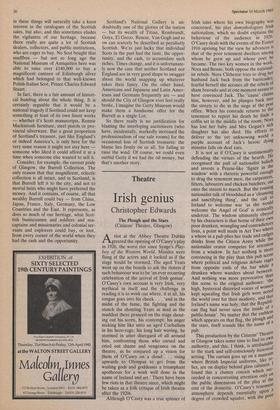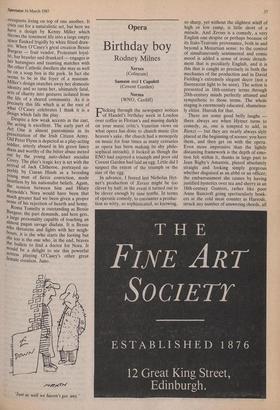Theatre
Irish genius
Christopher Edwards
The Plough and the Stars (Citizens' Theatre, Glasgow)
Ariot at the Abbey Theatre Dublin greeted the opening of O'Casey's play in 1926, the worst riot since Synge's Play- boy of the Western World. Missiles were flung at the actors and it looked as if the stage would be stormed. The aged Yeats went up on the boards to ask the rioters if such behaviour was to be 'an ever recurring celebration of the arrival of Irish genius'. O'Casey's own account is very Irish, very mythical in itself and the challenge in reading it is to work out where, if at all, his tongue goes into his cheek . . . 'and in the midst of the fume, the fighting and the stench the shouting Yeats as mad as the maddest there pranced on the stage shout- ing out his scorn, his contempt; his anger making him like unto an aged Cuchullain in his hero-rage; his long hair waving, he stormed in utter disregard of all around him, confronting those who cursed and cried out shame and vengeance on the theatre, as he conjured up a vision for them of O'Casey on a cloud . . . rising upwards to Olympus to get from the waiting gods and goddesses a triumphant apotheosis for a work well done in the name of Ireland and art.' There have been few riots in that theatre since, which might be taken as a folk critique of Irish theatre after the 1920s.
Although O'Casey was a true spinner of
Irish tales where his own biography was concerned, his play demythologises Irish nationalism, which no doubt explains the behaviour of the audience in 1926. O'Casey deals with the events of the Easter 1916 uprising but the view he advances is that of the poor tenement dwellers among whom he grew up and whose poet he became. The two key women in the work, Nora and Bessie, both oppose the national- ist rebels. Nora Clitheroe tries to drag her husband Jack back from the barricades; fearful herself she accuses all the rebels of sham bravado and at one moment seems to have convinced Jack. The 'cause' claims him, however, and he plunges back into the streets to die in the siege at the post office. When his comrade returns to the tenement to report his death he finds a coffin set in the middle of the room; N°ra has lost her baby and Mrs Gogan's sick daughter has also died. His efforts to deliver to the yet unknowing world a purple account of Jack's heroic dying minutes falls on deaf ears. It is not as if O'Casey is sentimentally defending the virtues of the hearth. He recognised the pull of nationalist beliefs and invests a Pearse-like 'figure in the window' with a rhetoric powerful enough to drag the tenement men, the carpenters, fitters, labourers and chicken butchers, out onto the streets to march. But the rousing nationalist talk of bloodshed as a 'cleansing and sanctifying thing', and the call to Ireland to welcome war 'as she would welcome the Angel of God' is ironically undercut. The wisdom ultimately obeYed by his characters is that borne of their own poor drunken, wrangling and contradictory lives, a point well made in Act Two where a whore in a pub plies her trade and cadges drinks from the Citizen Army while the nationalist orator competes for attention from a window. In fact nothing is more convincing in the play than this pub scene where political and religious debate rages from opposite ends of the bar while a drunken whore wanders about between. And nothing was more provocative than this scene to the original audience: the high, hysterical distorted voices of women, kept squealing that Irish girls were noteo the world over for their modesty, and that Ireland's name was holy; that the Republi- can flag had never seen the inside of a public-house'. No matter that the emblern, which appears on that flag, the plough an the stars, itself sounds like the name of 3 pub. This production by the Citizens' Theatre in Glasgow takes some time to find its own authority, and this, I think, is attributable to the stark and self-consciously historical setting. The curtain goes up on a museuill where British Imperial uniforms, like re: lics, are on display behind glass cabinets. found this a clumsy conceit which sue ceeded in concentrating attention only on the public dimensions of the play at the. cost of the domestic. O'Casey's tenemeor atmosphere depends essentially upon 3 degree of crowded squalor, with the pcor occupants living on top of one another. It cries out for a naturalistic set, but here we have a design by Kenny Miller which throws the tenement life into a large empty Space flanked frigidly by white fitted draw- ers. When O'Casey's great creation Bessie Burgess — fruit vendor, Protestant loyal- ist, bar brawler and drunkard — engages in her harangues and taunting matches with the other Catholic dwellers she may as well be on a soap box in the park. In fact she seems to be in the foyer of a museum. Miller's design snatches away her domestic identity and so turns her, ultimately fatal, acts of charity into gestures isolated from the life of a shared community. As it is Precisely this life which is at the root of What O'Casey celebrates I think it is a design which fails the play. Despite a few weak accents in the cast, the acting is excellent. The early part of Act One is almost pantomimic in its presentation of the Irish Citizen Army. Old Peter Flynn is depicted as a play-acting soldier, utterly absurd in his green fancy dress and worthy of the bitter abuse meted out by the young auto-didact socialist Covey. The play's tragic key is set with the arrival of Jack Clitheroe, portrayed su- Perbly by Ciaran Hinds as a brooding Young man of fierce conviction, made heartless by his nationalist beliefs. Again, the tension between him and Hilary Reynolds's Nora would have been that much greater had we been given a proper sense of his rejection of hearth and home. Roma Tomelty is outstanding as Bessie Burgess; the part demands, and here gets, a large personality capable of touching an almost pagan savage disdain. It is Bessie who threatens and fights with her neigh- bows, it is she who starts the looting but She too is the one who, in the end, braves the bullets to find a doctor for Nora. It would be a delight to see this powerful actress playing O'Casey's other great female creation, Juno.
'Just as well we haven't got any.'



















































 Previous page
Previous page